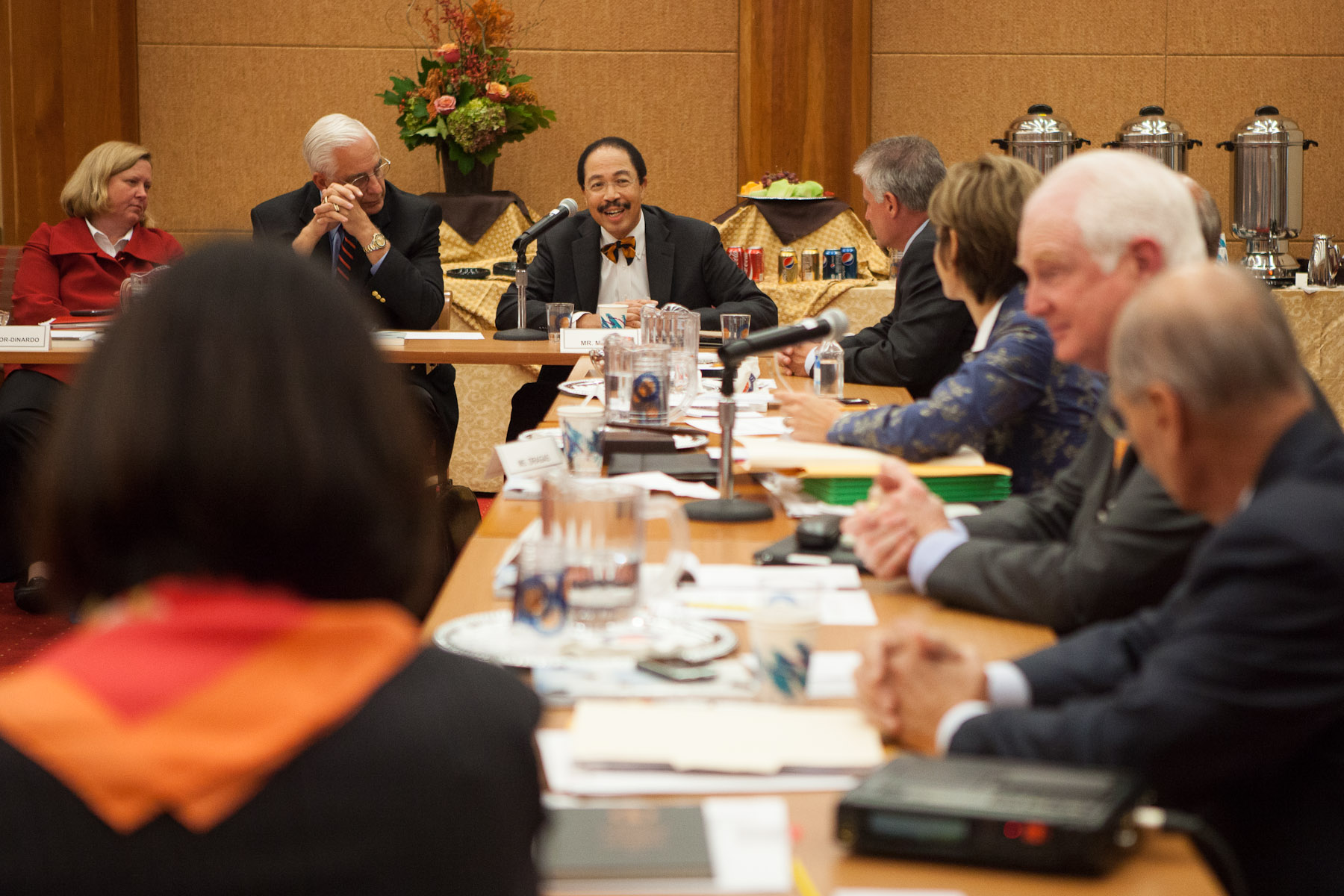President Teresa A. Sullivan’s proposal to raise pay for the University of Virginia faculty took center stage at Thursday’s Board of Visitors meeting, but continuing debate about how to best move beyond her resignation and reinstatement this summer bubbled up once again.
During her report, Sullivan urged the board to join her in making better faculty pay “our single most important priority for the coming year.”
“It’s very important we keep the top faculty whom we have right now,” she said.
Sullivan’s proposal is to raise faculty salaries into the top 20 of the American Association of Universities in average salary by 2016-17. U.Va. currently is ranked No. 26. The effort would cost a total of $65 million.
Paying for the plan will require money from a variety of sources, she said. The state’s biennial budget already includes a 2 percent raise for the next fiscal year, which is a start. But if the board approves Sullivan’s proposal at its November meeting, the plan will rely on a combination that could include: money generated from savings elsewhere, tuition, General Assembly funding, donors, the President’s Fund for Excellence, and possibly an increase in the annual endowment payout.
Increasing faculty salaries an average of 4.75 percent per year will reach the goal in 2016-17, Sullivan said.
“Almost nothing else we do this year will be as important,” she said.
Still, “events of the summer” continue to command attention, and the board’s first meeting on Grounds since Sullivan’s June 26 reinstatement provided yet another platform for debate.
During his report to the board, Faculty Senate Chair George Cohen stressed that the faculty supports the board’s decision to reinstate the president and is interested in joining with the board, administration and students to improve the university. He remained critical, however, of the board’s handling of the aftermath, describing the need for a complete self-assessment of what happened, why it happened and what can be learned from it to prevent a recurrence.
Cohen said there remains no “clear and satisfactory explanation” of the “philosophical differences” that were famously cited when three members of the board’s executive committee voted on behalf of the full board to accept Sullivan’s resignation in early June.
“A true reset is therefore possible only if those differences have been resolved in a mutually acceptable way,” he said. “But we are not clear what the differences were, so how can we know if they have been resolved? And if they have not been resolved, how can we have confidence that the board and President Sullivan can work effectively together?”
Cohen’s comments did not go without response.
William H. Goodwin Jr., appointed by Gov. Robert F. McDonnell in July as a special adviser to the board, strongly urged Cohen and others to stop dissecting the summer’s events.
“We need to leave the past alone,” he said. “The more you dig the more you make the University look bad.” Continued hand-wringing, he suggested, could hurt U.Va. in such rankings as the U.S. News & World Report college report, which this week kept U.Va. in the top 25 nationally and the No. 2 public institution.
“I would suggest to you it’s time to move on,” he said.
Board member Bobbie G. Kilberg, who joined the board in July, agreed.
“Frankly, I just want to move ahead,” Kilberg said. “I think we gain absolutely nothing by rehashing this.”
Sullivan told board members that her focus is on the future. In recent weeks, she has delivered remarks in several settings, including a Faculty Senate town hall, an alumni and donor event in New York and at the Miller Center on Wednesday.
During each of her appearances, Sullivan has not ignored the summer saga, and dodges no questions. But her core message has centered on priorities for the years ahead, such as faculty pay and retention, curriculum review, strategic planning and a need to focus research efforts on high-return areas.
“My remarks have been forward-looking. I don’t think it’s helpful to look back,” she said.
When Kilberg suggested Sullivan and others simply not discuss the events any longer, Sullivan replied, “I can’t control what people want to ask me about.”
Board member Timothy B. Robertson said he understands Cohen’s concerns, namely that many people are anxious to know what the board might do to prevent a repeat of events. He asked that people give the new special committee on governance and engagement a chance to deliberate, and predicted it will produce specific recommendations.
“That’s great,” Cohen said outside the meeting room. “That’s exactly what we’re looking for.”
Also at Thursday’s meeting:
- The board unanimously elected George Keith Martin of Richmond as vice rector, filling the term vacated by former Vice Rector Mark J. Kington, who resigned in June. Martin, managing partner of the Richmond office of McGuire Woods, is a 1975 graduate of U.Va. McDonnell appointed him to the board in July 2011. His election as vice rector means Martin will succeed Helen Dragas as rector of the University when her term expires next June.
- Board members also unanimously elected new members of the executive committee, who will join the rector and vice rector on that panel. They include: Robertson, John L. Nau III, Victoria D. Harker and Marvin W. Gilliam Jr.
- Resolutions of commendation were approved for former board members Kington and Robert D. Hardie, and for Stuart W. Connock, former executive assistant to the president for state governmental relations.
Media Contact
Article Information
September 13, 2012
/content/faculty-pay-discussion-summer-s-events-dominate-bov-meeting

